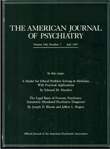TO THE EDITOR: I am writing to protest the selection of Dr. Paul C. Horton as reviewer for my book
Ultimate Intimacy: The Psychodynamics of Jewish Mysticism (
1). The book, which was edited by me and which contains contributions by a number of distinguished psychoanalytic colleagues and some equally distinguished scholars of Jewish mysticism, attempts, by example, to initiate the serious psychologic analysis of the phenomena of Jewish mysticism by using primarily a psychodynamic approach. Dr. Horton, on the other hand, is concerned not with understanding the psychology of the mystical experience so much as its celebration. “Nowhere in the book,” he says, “do we find resonances with the `unbound wonder and profound awe.and the feeling of unutterable happiness which is never forgotten' that is said to characterize the `true mystical experience.'” He continues, “Curiously, traditional psychoanalysts, such as the contributors to this volume.[set] rules for discourse about mysticism that would keep us in a religious conceptual playpen. Although the analyst may play the role of `apocalyptic seer'.there are no Maggids in psychoanalytic institutes.” Apparently, Dr. Horton interprets any psychoanalytic interest in the phenomena of mysticism as an attempt to restrict and thwart the practice of mysticism. Why would he—or anyone—look for maggidim in psychoanalytic institutes?
His resentment toward our endeavor causes him to misrepresent and misquote the text. “Jewish mysticism,” he tells us, “took its origin in the ninth through the thirteenth centuries.” Actually, as the text makes clear (p. 40), Jewish mystical documents appeared within one or two centuries before or one or two centuries after the Common Era.
Further, he writes, “The `ultimate intimacy' spoken of in the title is reduced to an unconscious repetition of children's `intense interest in their parents' toilet functions' (p. 205).” Let me give you the context from which that quotation is taken. On page 204 we find the statement, “Dr. Galenson informs us that in their earliest years, children exhibit intense interest in their parents' toilet functions.” The issue is the interpretation of a text from The Ethiopic Book of Enoch, which describes “streams of flaming fire” issuing from beneath a throne upon which the “Great Glory” was sitting. The text is considered in a demonstration of how historical-philological and psychoanalytic interpretation can be coordinated. A similar image occurs in Daniel 7:9–10. The argument assembles several pieces of evidence that suggest that the stream issuing from under the throne occupied by the divinity is a symbol for a urinary stream. The evidence is strongly suggestive and not at all far fetched. The chapter concludes with the statement that if that conclusion is correct, it “leads us right to the matter of our central concern - ultimate intimacy.” The rest of the book is concerned with interpreting the mystical experience as a regressive attempt once more to enjoy the comfort of physical closeness to and intimacy with the parents as one might imagine they were experienced in early infancy. It is one thing to contend that the image of the fiery streams leads us again to the issue of ultimate intimacy on the one hand, and taking it as the definition of ultimate intimacy on the other.
Horton takes issue with the author for reverting to archaic psychoanalytic paradigms. Nowhere does he indicate that the chief psychoanalytic parameter considered is affect regulation.
Dr. Horton concludes his “review” by congratulating the contributors “for their willingness to explore what Emerson has called `the region of grandeur which reduces all material magnificence to toys, yet opens to every wretch that has reason the doors of the universe.'”
It is quite clear that Dr. Horton is not interested in what our book is trying to do and condemns it because it is not a different book.
Yet he ignores the final sentence of the book, which might have been expected to please him. “Many of us who cannot accept the non-rational assumptions necessary to embrace mysticism might nevertheless find a certain degree of comforting spiritual experience in studying what it is, what it does, how it has influenced the lives of millions of people of every religion over the centuries, and where it might take us in the future.”
Dr. Horton should not have been invited to review this particular book, and, having been invited, in fairness, he should not have accepted.
I respectfully request that the book be assigned to a more objective referee for a proper review.

